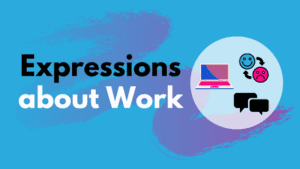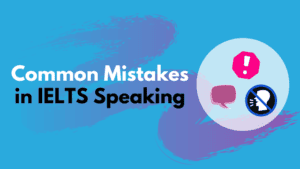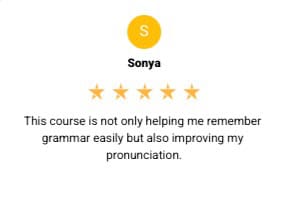The Secret to Advanced English Listening Skills
👇 Take this lesson with you! 👇
Table of Contents
In this lesson, I want to show you probably the most important secret that will help you improve your English listening skills.
The pronunciation of strong and weak forms
Good listening skills all depend on expectations.
First of all, the context helps us guess the words someone will say.
We also use expectations to guess what sounds you will hear.
So you expect someone leaving home in the morning with a bag to say something like.
I am going to work
But what sounds do you expect to hear?
You may expect to hear each word pronounced clearly, but in fact this is not correct.
For example, the word TO, can be pronounced in two different ways.
- To /tuː/ = Strong form (when ‘to’ is stressed)
- To /tə/ = Weak form (when ‘to’ is stressed)
And 90% of the time, we pronounce ‘to’ as the weak form /tə/.
Here’s the secret! There are around 40 words in English that have both weak and strong forms.
These include verbs, pronouns, prepositions, conjunctions and even articles.
The key thing is these are some of the most frequently used words in English.
So if you know the weak form (which is used for unstressed words) and you know the strong forms (for when it is stressed) and you practice listening more for them, then your listening skills will improve dramatically.
When I started teaching this to my students years ago when I first became a teacher, it was a game changer.
8 of the most common weak forms
Let’s look at 8 of the most common words that have strong and weak forms.
- You
- Are
- Do
- Can
- To
- For
- And
- A
1. You
You (strong) /juː/
You (weak) /jə/
Look at this phrase below. What sounds do you expect to hear?
You look great!
If we stress the adjective ‘great’, we would hear the following;
You look great! /jə lʊk ɡreɪt/
Here are some more similar examples;
You look great /jə lʊk ɡreɪt/
You look amazing /jə lʊk əˈmeɪzɪŋ/
You look bored /jə lʊk bɔːd/
To improve your listening skills, do not try to hear the unstressed word, but rather focus on the stressed word.
2. Are
Are (strong) /ɑː/
Are (weak) /ə/
Look at this phrase below. What sounds do you expect to hear?
Are they here?
If we stress the adverb ‘here’, we would hear the following;
Are they here? /ə ðeɪ hɪə/
Here are some more similar examples;
Are they here? /ə ðeɪ hɪə/
Are they ready? /ə ðeɪ rɛdi/
Are they late? /ə ðeɪ leɪt/
3. Do
Do (strong) /duː/
Do (weak) /də/
Look at this phrase below. What sounds do you expect to hear?
Do they know?
If we stress the verb ‘know’, we would hear the following;
Do they know? /də ðeɪ nəʊ/
Here are more examples;
Do you know? /də jə nəʊ/
Do you know his name? /də jə nəʊ ɪz neɪm/
Notice we can stress DO or YOU to emphasise them, but it changes the meaning.
Do you know? /də juː nəʊ/
This means ‘I don’t know, what about you?’
Do you know? /duː juː nəʊ/
This means ‘Really? I’m not sure if I believe you!’

4. Can
Can (strong) /kæn/
Can (weak) /kən/
In questions, we would use the weak form, for example,
Can you swim? /kən jə swɪm/
In general positive statements, we would also use the weak form, unless we were emphasising the verb ‘can’.
I can swim a bit /aɪ kən swɪm ə bɪt/
5. To
To (strong) /tuː/
To (weak) /tə/
What time is it in this clock?

It’s five to two
Here, you can hear both the weak form of the word ‘to’ /tə/ and the number two, which is pronounced /tuː/
Look at this phrase below. What sounds do you expect to hear?
Do you want to go?
Assuming we dress the verb ‘want’ you would hear;
Do you want to go? /də jə wɒn tə ɡəʊ/
Notice we can stress DO or YOU to emphasise them, but it changes the meaning.
Do you want to go? /də juː wɒn tə ɡəʊ/ = I don’t, what about you?
Do you want to go? /duː juː wɒn tə ɡəʊ/ = Really? I’m not sure I believe you!
6. For
For (strong) /fɔː/
For (weak) /fə/
Look at this phrase below. What sounds do you expect to hear?
This is for you
Normally, we would stress the pronoun ‘you’ and so you would hear,
This is for you /ðɪs ɪz fə juː/
Some more examples are;
It’s for you /ɪts fə juː/
It’s for me /ɪts fə miː/
It’s for him /ɪts fə hɪm/
7. And
And (strong) /ænd/
And (weak) /ən/
One of the most famous dishes in the United Kingdom is ‘Fish and Chips,’ but how is that said?
Normally, we don’t stress the word ‘and’. We use the weak form, so it sounds like this,
Fish and chips /fɪʃ ən tʃɪps/
Here are some more examples;
You and me /juː ən miː/
She is tall and beautiful /ʃi ɪz tɔːl ən bjuːtɪfəl/

8. A
A (strong) /æ/
A (weak) /ə/
In all of the following examples, ‘a’ is not stressed, so we use the weak form /ə/, sometimes called the ‘schwa’.
I am a teacher /aɪm ə ˈtiːtʃə/
She’s a doctor /ʃiːz ə ˈdɒktə/
He’s a banker /hiːz ə ˈbæŋkə/
Tips for Listening Practice
1. Focus on the gist
When listening to English, don’t try to understand everything, focus on the gist, the overall meaning.
To understand the gist, you need to focus on the stressed words, and of course, be aware that weak forms will be used a lot.
Also, remember, whatever your level, there will always be things you don’t understand. Accept that, and continue to listen.
2. Do meditation listening
This is where you listen and close your eyes. Your focus is on sounds rather than the meaning.
You become present and just focus on each sound as it appears.
It’s a very soothing and relaxing experience and a great way to improve your listening skills.
Remember the secret is to practice. I recommend you listen to one hour of English a day.
Improve your Speaking Skills with this Free Course
Crack IELTS Speaking Part 1
Learn to Speak with Confidence in Part 1 of Your IELTS Test!
⭐️⭐️⭐️⭐️⭐️
‘It’s such a great course. I’ve learned so many usages for speaking part 1.’
Zu Htet





